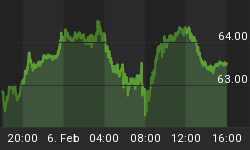When home prices skyrocketed in the early part of this decade, everyone seemed to forget that the subprime borrowers were high risk by definition. Now that losses are snowballing, lenders are belatedly rethinking the "wisdom" of making such loans in the first place. Similar conclusions will soon be reached by foreign nations that have supplied American consumers with goods that they can not afford. In reality, America is a nation of subprime consumers.
For most of recorded history, nations have paid for their imports with exports. When a nation runs a trade deficit, and instead pays for imports with its own currency, it in effect issues an IOU to the seller to buy an exported good at a future date. After all, the currency of the nation running the deficit is only legal tender in the country of issue, and is therefore useless to other nations unless it can be exchanged for goods in the issuing country or exchanged for other currencies. However, no matter how many times the currency is passed around, at some point the final holder must spend the money on something in the issuing country.
By providing goods in exchange for IOUs, foreign nations are in essence engaged in vendor financing. This concept came to mass attention during the dot.com boom, when many telecommunications equipment companies sold their goods to give cash to poor start-ups in exchange for credit or stock positions (in effect, IOUs). When the dot coms went bust, the equipment providers were forced to restate earnings as losses.
As the world surveys the landscape of the American economy, it will notice an industrial base too hollow to produce sufficient quantities of exportable consumer goods necessary to make good on our outstanding IOU's (U.S. dollars). As those dollars continue to lose value, the losses will suddenly become increasingly apparent. Just as lenders eventually figured out that loaning money to borrowers who could not pay them back was a bad idea, nations will discover that selling products to Americans who can not afford to pay for them is just as foolish.
Think about this. Currently, foreign tour operators are organizing shopping tours, where foreign citizens fly to America for the specific purpose of buying goods cheaper here than they can buy the same goods in their own countries. Of course, most of the goods they are buying, such as clothing, electronics, jewelry, etc., were not made in America in the first place. How absurd is it for Italians to come to New York to buy Italian made shoes cheaper than they can find them in Milan? Does it make sense for foreign producers to offer products to Americans for less than their own citizens? Of course not. In short order the free market will correct this by raising prices here in America and lowering them in the rest of the world.
Many naively believe that this scenario is unlikely as foreigners will indefinitely prop up the U.S. economy in order to preserve their "best" export market. However, the same argument could have been made regarding mortgage lenders and subprime borrowers. After all, based on the outsize fees generated by subprime lending products, risky borrowers were clearly the mortgage industry's best customers. Given their profitability, why didn't lenders simply extend subprime borrowers even more credit to preserve the market? The obvious answer is that at some point lenders discovered that the market was not worth preserving. They realized that the short-term profits came at the expense of far greater future losses.
The same revelations are about to be made around the world as other nations realize that selling consumer goods to Americans is a losing proposition, as the profits they believe they are earning today will simply evaporate tomorrow. When that happens, just as subprime borrowers are losing access to mortgage credit, America's subprime consumers will find far fewer bargain basement imported products at their local Wal-Mart.
For a more in depth analysis of the tenuous position of the American economy, the housing and mortgage markets, and U.S. dollar denominated investments, read my new book "Crash Proof: How to Profit from the Coming Economic Collapse." Click here to order a copy today.
More importantly, don't wait for reality to set in. Protect your wealth and preserve your purchasing power before it's too late. Discover the best way to buy gold at www.goldyoucanfold.com, download my free research report on the powerful case for investing in foreign equities available at www.researchreportone.com, and subscribe to my free, on-line investment newsletter at http://www.europac.net/newsletter/newsletter.asp.















